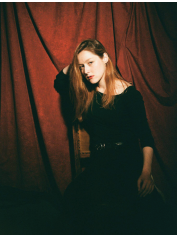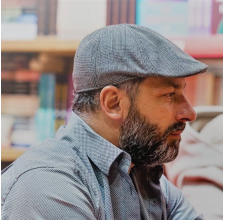Ivona Djurić (born in
Belgrade, 1994) completed
her studies in Theory of
Dramatic Arts and Media
at the Faculty of Dramatic
Arts in Belgrade. As a
journalist, art critic and
essayist, she has collaborated
with various cultural and
artistic portals. Since 2020,
she has held a permanent
position as an associate
at the online film portal
Filmoskopija (Film Center
Serbia). In addition to
this, Ivona Djurić actively
writes fiction and engages in
performance art.
- The impact of the social and cultural environment is an ever-present factor in every form of creative expression. We are all part of collective enterprises – an artistic wave, a historical moment…I nfluences are inevitable. We are all products of the culture, we are not born as “tabula rasa”. Moreover, every human being has something authentic that navigates them to a certain interest. It can be either encouraged or stifled. Nevertheless, I grew up under quite challenging social circumstances, marked by adverse social and economic conditions, the erosion of values, and the state’s failure to foster culture, which profoundly affected all young artists and cultural workers. Despite these challenges, I am thankful for my upbringing in Belgrade. The city is teeming with enthusiasts who initiate cultural centers, literary workshops, poetry nights, and more. Thanks to these, I had the opportunity to engage with the contemporary scene and meet individuals dedicated to their art. Having observed their devotion provided me with motivation and inspiration to do the same. In these places, I had the opportunity to receive feedback on my work, thus realizing that art and writing are endeavors worth pursuing. The surroundings, in fact, gave me the courage to follow my creative voice. In this sense, the community is crucial.
- For me, inspiration typically emerges from emotions intertwined with my immediate surroundings, whether they originate from a childhood memory, a random encounter on the street, a family photograph, and so on. Consequently, my immediate environment significantly shapes my writing. This inclination is chiefly driven by my desire to view everyday life from a different perspective, bringing to the forefront those subtle details, frequently overlooked, that can carry a story in itself. In my creative work, I am primarily intrigued by the intricacies of human nature and its contradictions. For this reason, the town, village, and neighborhood I am intimately connected to, often take center stage in my prose. Additionally, certain cultural aspects, such as Serbian and Balkan ethnology, and ex-Yugoslavian iconography, sometimes play a substantial role. Speaking of the country in political terms, it’s not my primary interest, although it is reflected in depictions of the community, family, or an individual.
- During my residency in Tirana, I had an exceptional opportunity to fully dedicate a month solely to writing. Additionally, as a guest at the “Tirana Gate” literary festival, I got in touch with the Albanian contemporary literature, previously unfamiliar to me, and seizing the opportunity to present my own work to the local audience. The connections and friendships I formed, and the brief excursions outside the city, were particularly meaningful. Living there for a month and immersing myself in the local culture somehow strengthened my observation skills, which I later applied to my writing. As the program concluded, I felt that I had returned home with something profoundly beautiful that had left a lasting impact on me. I am deeply thankful for the entire experience.
- Primarily, I write because of the process itself. It’s a strong internal drive that allows me to exist in different space and time. Also, it serves as a form of self-therapy, enabling me to explore my inner demons, find new facets of myself, and transform struggles into tangible expressions. Ultimately, writing is a way of searching for truths about human nature and the universe




